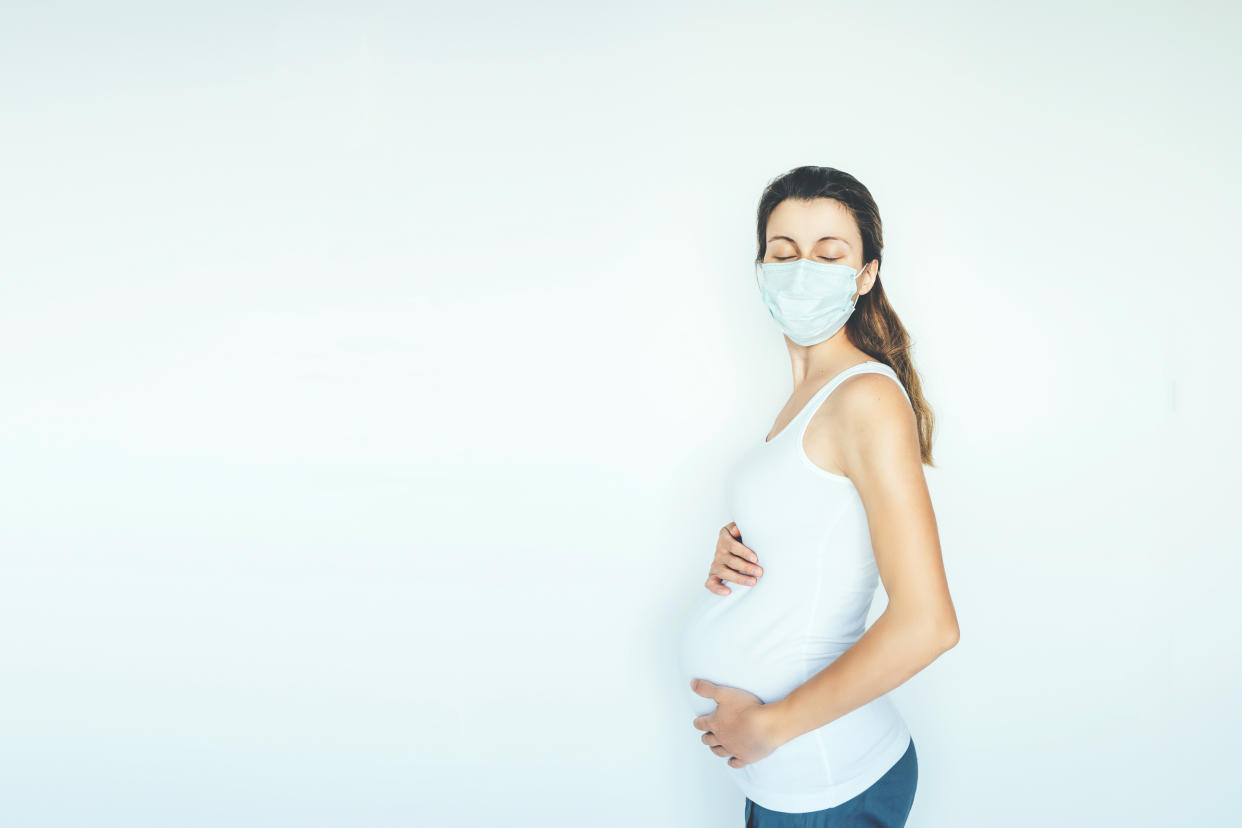Pregnant women with coronavirus: New study finds majority were ‘asymptomatic’

Alexandra Schneider was almost 20 weeks pregnant when she woke up one mid-March morning unable to smell anything. Four days prior, her husband had come down with a fever, and a fluish feeling that worsened over the next few days. But, living in New York, he wasn’t sick enough to be able to access a test. Schneider says her husband’s symptoms improved on their own a few days later, which was comforting — until her sense of smell disappeared.
“I noticed right away,” Schneider, who has temporarily relocated to St. Louis with her family, tells Yahoo Life. “I made coffee and I couldn’t smell it.” As the day wore on Schneider tried smelling everything she could find, from grapefruit soap to spicy tomato sauce, to see if it would come back. Nothing. Aware of news that some COVID-19 patients have been losing their sense of taste and smell, she consulted with her ob-gyn, who said to monitor her temperature in case she got a fever. But she didn’t.
“[Loss of smell] was my only symptom,” Schneider says. “I basically checked my temperature every hour for four days.” After less than a week — in the absence of any additional COVID-19 signs — her sense of smell returned. “The whole thing was terrifying,” she says. “If my husband could have been tested that would have given us reassurance.”
It’s impossible to know whether or not Schneider was infected with the coronavirus. But a new study from the New England Journal of Medicine suggests that pregnant women like her may be getting the virus with very few — or no — symptoms at all, a remarkable shift from the response that pregnant women typically have to other infections, like influenza.
The study, which was performed at two New York City hospitals, tested all 215 women for coronavirus who came in for births between March 22 and April 4. Out of the 33 women who tested positive for the coronavirus, 29 were asymptomatic upon admission. Three of those patients ultimately developed a fever, but two were presumed to have endomyometritis, a pregnancy complication that causes fever.
“Our use of universal SARS-CoV-2 testing in all pregnant patients presenting for delivery revealed that at this point in the pandemic in New York City, most of the patients who were positive for SARS-CoV-2 at delivery were asymptomatic,” the authors write. The study’s principal author, Dena Goffman, MD, chief of obstetrics at New York-Presbyterian and professor at Columbia University Medical Center, tells Yahoo Life the reason has been elusive. “While there are immune system alterations in pregnancy, we don’t yet know enough to understand how this impacts COVID susceptibility or response,” Goffman tells Yahoo Life.
The study is not the first to show mild or no symptoms of COVID-19 among pregnant women. A similar analysis, published by the American Journal of Obstetrics & Gynecology on April 7, found that out of 43 pregnant women who tested positive for the virus in New York, 37 experienced a “mild” version of the illness. Both studies point to an unexpected reaction to the virus among a demographic that is often more susceptible to becoming seriously ill from other infectious diseases.
Gregory A. Poland, MD, an infectious disease expert and head of the Mayo Clinic's Vaccine Research Group, tells Yahoo Life that the results are unexpected. “I am surprised — very surprised,” Poland says. “COVID-19 and influenza are different diseases, but in many ways, they’re alike. So you would have guessed that [pregnant women] would do poorly.”
Many studies have shown that influenza is more likely to cause serious illness in pregnant women, and more likely to be fatal. Poland says one reason for this is that, especially for women in their third trimester, pregnancy can make it difficult to fully expand the lungs. Additionally, he says that the immune systems of pregnant women become diminished so that they do not reject the cells of their fetus. Given this, he’s unsure how the response to COVID-19 in this population has not been more dramatic.
“You have a dampened down immune response, you have a compromised respiratory condition and you have a virus that has a primary infection spot that is the lungs,” Poland says. “So my question is, why aren’t they having a more complicated disease?’”
Poland notes that while it’s unclear exactly why pregnant women in the studies seem to be getting less sick, science has shown that women are, in general, better than men at fighting off disease. “For reasons no one understands, women survive infectious diseases better than men,” Poland tells Yahoo Life. “They survive dehydration better than men, they survive starvation better than men. But the other side of that coin is that by far, women experience more autoimmune diseases.”
He says that last point may potentially provide a clue, as autoimmune disorders often go into remission in women who are pregnant. Whether or not that dampened immune response is a sign of what’s happening with COVID-19, however, no one can be sure. But what the study does prove is that universal testing (meaning both of symptomatic and asymptomatic people) is valuable. “This is an interesting but very limited report,” says Poland. “But I think its value is in the title: universal screenings.”
For the latest coronavirus news and updates, follow along at https://news.yahoo.com/coronavirus. According to experts, people over 60 and those who are immunocompromised continue to be the most at risk. If you have questions, please reference the CDC and WHO’s resource guides.
How to maintain your physical and mental health during the pandemic
Taking care of a loved one with COVID-19? Here’s how to stay healthy
Q&A with Dr. Kavita Patel: How to keep your family safe and maintain your mental health



